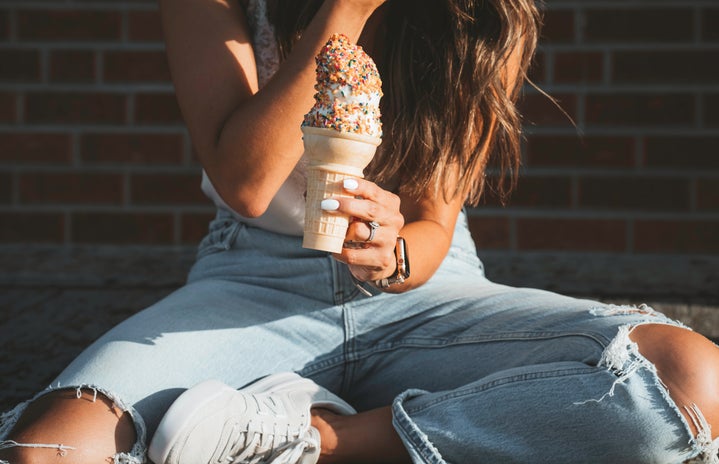TRIGGER WARNING: THIS ARTICLE CONTAINS CONSISTENT AND EXPLICIT MENTION OF RESTRICTED EATING/EATING DISORDERS/BINGE EATING/BODY IMAGE AND WEIGHT.
We are writing this article in hopes to normalize healthy, productive and open conversations about disordered eating. Also, we hope it may illustrate the true volume of an eating disorder, and not the romanticized view of it that our society has adopted. Disordered eating has become far too normalized and admired. This is us trying to do our part in acknowledging the true, malicious nature of it.
mayra
Flashing blue, red and yellow, spots overpowered my vision. I had been exercising for hours, running on the green smoothie from the morning. Weak, dizzy and out of breath, I stepped into the hallway of my home. One hand on my chest, the other gripping the wall, all while gasping for air. For the first time, I fully understood the weight of my illness.
It’s hard to admit I was mentally ill. My binge eating disorder completely shattered my self-esteem and love for life. When I first became aware of the difference between my physical appearance and society’s standards, I became obsessed with losing weight. Sadly, it was not just because of the media. The ideal body was reinforced by comments made by family members. To a little girl, their words hurt. At the time, mental health awareness was not as widespread or discussed. It took some time before it became the supportive and inclusive movement it is today. For the first few years of my illness, it festered and grew.
The obsession began to surface at age 12. By age 13, I completely hated myself. I couldn’t look in the mirror without criticizing every inch of my body. I started to eat less, but less sometimes turned into nothing. Starvation led to impulsive eating. I would starve myself for the day — drinking only a smoothie or eating a bowl of veggies.
At night the monster came out. I couldn’t control myself because hunger was stronger. I would end up eating anything and everything in my kitchen. I would eat foods I didn’t like and still keep on eating, even after I was full. I’d feel so disgusted and guilty so I would exercise right after, thinking that somehow that would rectify what I’ve done. I endured many phases: an obsession with exercising, strict calorie counting, excessive green tea drinking and other extremes just to end up back to square one, multiple times.
At age 15, the disorder consumed my life. All I thought about was food. I couldn’t escape the cycle. I would start the week with a “healthy” diet then I’d ruin it if I ate any junk food (so for that day I had failed). I’d try again the next day and then again and again. It was exhausting to think, do and feel. I was able to hide my eating disorder from others. To the world, my weight was just fluctuating but inside, I was dying. I was severely depressed and numb to life.
Fortunately, my story has a happy middle. I say middle because the trauma is still in my body. I expect my future to still have the negative thought patterns that sometimes seep through the cracks of progress. At times, it’s also in subtle mannerisms that reflect insecurities rooted in disordered eating.
In the early stages of the disorder, when I was trying to figure out what was happening to me, I tried to seek help but it was diminished to a teenage phase. To be transparent, I was never medically diagnosed, but I’m still haunted by it.
This is not to discourage anyone from asking for help, but rather to reveal that sometimes people may have their struggles belittled by others. The suffering is valid and that everyone is worthy of healing and self-love.
I wish I could say I have the antidote to mental illness, but I don’t. The hard truth is that you have to choose to live. My wake up call came at age 16 when my vision blurred and my fragile body weeped for sustenance. From that day on, I fought harder than I ever did before. It’s been years of self-healing. I changed my thinking and in turn, I changed my habits that eventually changed my life. I know that I have to go through the hard work, where I will eventually find peace and love for life once more.
molly
My mom always believed that some people eat to live and others live to eat. By this, she meant that some people only eat because they have to, and others actually enjoy the act of eating and cooking. Her and my brother were always the latter — they’d spend hours at a time in our small kitchen making chili, baklava or some other delicious dish. I’d never felt such a distinct connection with food.
Since I was young, I’ve been on the skinnier side. People always say that they would ‘kill to have my genes’ or that they were jealous of me. I never thought much of it. My brother was the exact same way. However, there was an dark side to the praise:
“Are you anorexic?”
“Do you even eat?”
“Get a burger or something.”
Most of the time, these comments didn’t bother me. I knew better than to let them get to me. Yes, I had a faster metabolism than some people, but it was just my body and the way it worked. I didn’t think I was better than anyone because of it or that anyone was better than me.
Around the second semester of my freshman year of high school, I developed a nasty, conscious habit of waking up at 6 AM for school, drinking 3 shots of pure espresso, and not eating any food besides a bag of goldfish until around 5 PM. It was not a reflection of how I felt I had to look, but rather a direct result of being a burned out high school student. This habit continued for over two years, five days a week.
I didn’t even notice the change in my weight. Sure, a part of me was always insecure, but it was never more than any other average teenage girl. It was never enough for me to feel the need to restrict my eating habits. I had also been conditioned (thanks to social media) to think that a sudden drop to dangerously low weights was normal — even admired.
Then the COVID-19 pandemic hit.
Not only was I still subconsciously restricting my eating habits, but now I had no distractions. Along with the rest of the world, I was stuck in my room with nothing but my thoughts.
And of course, TikTok found a way into my life.
One cold March morning, I saw a TikTok made by a very pretty, skinny model. Her videos were not in any way meant to be triggering, she was just another teenage girl dancing on TikTok. I remember thinking, Wow, I wish I looked like that.
I became obsessed. It was a slow progression. Every morning, I would wake up, do a body check in the mirror, eat a rice cake, drink two shots of espresso, and only do this routine for about nine hours. Body checking was the first thing I did when I woke up and the last thing I did before going to sleep. I used to not allow myself to eat within four hours of showering, simply because I would not be able to handle the sight of my naked body if it wasn’t as skinny as I wanted it to be.
Eating became a chore. It was something that I knew I needed to do, but not a single part of me wanted to do it. In my efforts to make my body contort into something it was not meant to be, the ugly habits I had developed had finally been brought into light.
Unfortunately, eating disorders are not something that just go away. They require attention, commitment and a very high level of self-control. When I reflect on my habits now, I think the saddest part is how conditioned my generation is to think that disordered eating is normal. It is seen everywhere in the media and advertised everywhere.
The second I recognized the restrictions I placed on myself throughout the past two years, I realized that I may have been more conscious about it than I thought. The amount of food I had been consuming in a day, since my freshman year of high school, had not been anywhere near enough. I eventually told my mom.
She listened and allowed me to be vulnerable about something so personal. Still in the midst of the pandemic, we both carefully began monitoring my eating habits and tackling it together.
The biggest changes and improvements had to come from me and my actions, and its something I still struggle with. Even now, I hate eating alone because I will think about the amount of food and the calories that I am consuming.
It’s a slow progress.
Healing is not linear.
And that’s okay — as long as you are healing.
We hope that after reading our individual stories, readers can see that eating disorders do not always look the same. They come in different shapes and sizes, but the common denominator is the never-ending struggle against these harmful habits.
If you or someone you know is struggling with disordered eating, there are resources available to help with recovery:
- UCI Student Health Center
- UCI Counseling Center (for therapy or body image support group)
- Eat-26 (self-test)
- National Eating Disorder Association
- ANAD (FREE Eating Disorder Support Groups & Services)
- 70 Resources to Support Eating Disorder Recovery
- Disorder Eating Hotline: 800.931.2237


